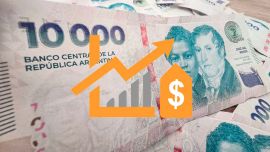The spring that officially begins today brings sour news in the opinion polls for President Javier Milei. All surveys indicate that his approval ratings have declined over the last few weeks, although they remain at a healthy average of around 45 percent positive. Given the scale of the economic adjustments his administration is implementing, this decline is occurring later than initially expected, but it is happening nonetheless. The trajectory from here will largely depend on the actions taken by the President and his inner circle.
Milei's reputation has thus far rested on three main pillars: first, the slowing of inflation; second, his anti-establishment rhetoric; and third, the discredited opposition. However, the public is beginning to notice that the recession is deeper and longer than anticipated (the INDEC national statistics bureau has reported a 3.4-percent contraction in the first half of the year), and that prosperity may not be just around the corner. If the light at the end of the tunnel fails to appear, Argentines may start to question Milei’s ability to deliver results.
In his Budget presentation to Congress last week, the President sought to capitalise on Argentina’s anti-“caste” sentiment. However, Milei struggles to align his quixotic fight with the political realities surrounding him, particularly in his relationship with Congress. Realpolitik is gaining ground, and he is now personally engaging in the more unsavoury aspects of politics. Not used to this, he has made some unforced errors: hosting a barbecue at the Olivos presidential residence for a group of loyal deputies who helped uphold his veto against an increase for retirees is something his top spin doctor, Santiago Caputo, should have advised against.
The issue that most concerns Milei is the public’s perception of his ability to fix Argentina’s economy in a reasonable timeframe. “Fix” means that inflation will be lower than it is now and that the recession will end. A recent poll by Zuban Córdoba revealed that only four out of ten respondents have some trust in Milei's ability to improve the economy. Broadly, this is what the 2025 Budget proposal promises: inflation at around one percent monthly and the economy growing by five percent next year.
A closer look at the details makes it difficult to see how he will do that. For starters, Milei continues to evade the question about how and when his government will lift the foreign exchange market restrictions that have been in place for over five years in their current form. The “cepo,” or “clamp,” as it is popularly known, seems set to remain throughout most, if not all, of 2025, especially since the Budget drafted by Economy Minister Luis Caputo projects an official exchange rate of 1,207 pesos per US dollar by the end of next year – only slightly lower than many current parallel exchange rates. Instead of lifting the cepo, Milei has proposed imposing another clamp on government spending, with a new and stricter fiscal programme.
So far, the administration has felt comfortable making spending adjustments, but 2025 is an election year, in which 46 percent of the seats in Congress will be renewed. Milei needs his candidates to win (he will not be on the ballot) to have a politically more favourable second half of his term.
The Zuban Córdoba poll revealed that only one in four Argentines believe their personal economic situation is better with Milei in office, while two-thirds report that they are relying on savings to make ends meet. This situation must improve dramatically for Milei by the time Argentines translate their views into votes a year from now.
As you read this, the most heated debate within the Milei administration revolves around whether the current economic trajectory will position the government favourably for next year’s elections. The consensus — and Milei's opinion — tends to be optimistic: that Argentines will continue to value stability, lower inflation, and anti-establishment bravado.
It is a risky bet, but the President seems willing to take it to avoid the more dramatic risk of opening the exchange rate market and suffering a run on the peso. Milei’s Budget plan and speech signal that he continues to believe his aggressive fiscal policy will ultimately pay off. The government is showcasing every piece of data supporting this view, such as the 2.1-percent increase in wholesale prices reported for August, the lowest in more than four years. However, counter-evidence exists: unemployment in Buenos Aires was reported to be at 7.3 percent in the first half of 2024, the highest level in two years.
Milei’s political future lies within a triangle defined by inflation, approval ratings, and unemployment. He believes that success in addressing price hikes will bolster his approval ratings and that Argentines will overlook unemployment. But for how long? Neither he nor we have an answer to that.























Comments